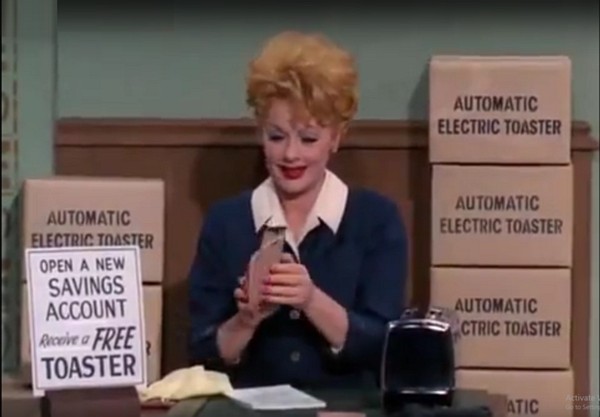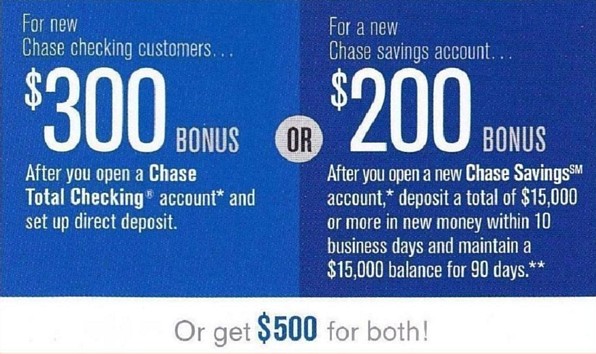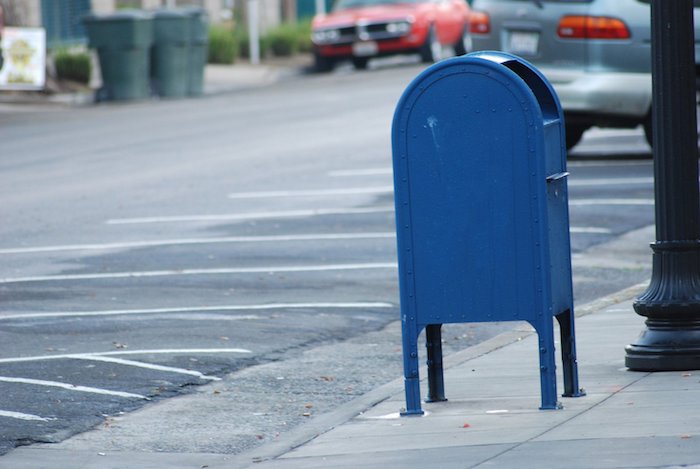Today’s Brandon Asks question comes from Rich, who writes:
“I have never dipped my toe into bank bonuses. I’ve seen that Discover Bank will pay $200 to park $25K for about a month. That seems very easy and straightforward to me. Any thoughts? Better suggestions? Watch-outs?”
Sam: Thanks for the question Rich. Today’s Brandon Asks question might seem to be a little off the stated path of this blog, seeing as how we’re not talking about credit cards, miles, or travel here. But I think Rich’s question is actually very much related to the space we’re all in. Money is money and miles aren’t, which is something we’ve long talked about here on the blog.
Rich is asking about Bank bonuses, which have quite a long history in this country. For a more ‘real-world’ view of the history of bank bonuses, how about Lucille Ball? Here she is soliciting new accounts with toasters back in the 60’s on an episode of the Lucy Show:

Gone are the toasters, and you now just receive cash for opening a new account. Rich’s offer is one example of the major types of bank bonuses out there. I like to group bank bonus offers into the following categories:
- Parking Large Sums of Money
- Direct Depositing a Certain Amount
- Opening An Account, no strings attached.
As you step through these offers they get progressively easier to calculate whether they are ‘good ideas’ or not. Moving large sums of money and parking it there is the most cumbersome. Direct depositing funds a few times is quick and easy, so long as you have access to DD, or a proxy for it. And finally, if a bank is going to pay you to open an account with no strings attached (and no monthly fees) that’s the ultimate bank bonus–and one that needs little to no thought.
I would assume every single person reading this is well aware of Doctor Of Credit’s excellent “best bank account bonuses” page. I particularly like that DoC outlines the best way to avoid monthly fees on these new accounts, and takes into consideration the opportunity cost of parking funds in high yield savings/checking vs. the bonus.
With Rich looking at a Parking bonus, my initial reaction is to ask, what are the fees, and what’s the loss of interest if he held the money somewhere else? Anything else you think Rich should check before going for this bonus Robert?
Robert: Hey Rich, thanks for the question.
I’ve dabbled in bank bonuses with varying degrees of enthusiasm over the years. I think it’s smart and natural to ask: “I’m getting these credit card bonuses, why not get some bank bonuses?”.
Sam, that clip from The Lucy Show is awesome. From the thumbnail I thought for sure that Lucy herself was recklessly signing up for new savings accounts to get toasters. But if you watch it you’ll see how a lot of notions about banks and signup bonuses have been around for a long time. Refer-a-friend, skepticism about whether gaming signup bonuses is legal, and even withdraw/re-open stunts. It’s all there.
The clip also gets into financial inertia whereby human nature is to keep money where it is unless you have a reason to move it.
That’s why signup bonuses exist: To compel us to go through the hassle of switching.
I mentioned on the Saverocity Observation Deck podcast way back when that my grandmother used to get refrigerators and musical instruments like upright electric organs for opening checking accounts. As Sam mentions: Bank bonuses are nothing new.
I like to think about bank bonuses in terms of the Why, the How, and the [potential] Gotchas.
Reasons to pursue bank bonuses (the Why):
- Signup bonus
- Opportunity to fund with credit card
- Unlock relationship opportunities
- Money order depository
Requirements to get the bonus (the How):
- Minimum balance (cash or investments)
- Duration of relationship maintained
- Direct deposit required?
- Requirements for fee avoidance
- Account closure fee
- Time until bonus paid
- Churnability
Things that can go wrong (the Gotchas)
- The bank might perform a hard pull on your credit report
- You fund with a credit card but it runs as a cash advance
- You miss some important fine print and rightfully miss out on the bonus
- You meet the requirements yet the bank doesn’t pay out and you have to hound them
- The bank makes it painfully difficult to close the account (especially common when you’re out of their service area)
I’d like to go a little further into things that can go wrong (and have) in this space…
Imagine you find a theoretically unlimited credit card funding situation at an obscure local bank. To maximize the opportunity you fund it right up to the limit of your most rewarding credit card. Things seem fine when the money shows up in the new checking account. But then a few weeks later you log into your credit card account to find you have $0.00 credit available. You call the number on the back of your credit card to find you’ve been shutdown. They thought you were at risk of running up a high balance then busting out on your debt obligation.
Let’s take this a little further. Say you hear about a credit union in another state that has a theoretically unlimited funding situation. You’ve got a very large credit limit on one of your cards so you fund the new account with a large amount thinking you’ll be able to pay off the credit card with funds from the account before incurring interest charges.
But after funding your account the credit union notices you’re outside their service area. They ask you how you intend to qualify for membership with the credit union. You say “How should I know? You’re the ones that let me open and fund the account.”
You fight with them for a couple of months but meanwhile you’ve got a large balance on your credit card you need to pay off until you get your funds back from the credit union -or- convince them you can become a member. It’s a mess of a situation that absolutely can happen.
So in my experience with bank account bonuses, there are some opportunities. But things can and will go wrong.
All that said, I need the signup bonus to be large enough to make it worth my while given all the things that can potentially go wrong.
What’s been your experience, Sam?
Sam: Wow, those two specific malfunctions you list above sound pretty terrible. I must be lucky that I’ve skirted all of pitfalls you list above. My only malfunction was the when I did not read all the fine print and ended up not qualifying for the bonus. That’s not really the bank’s fault–it is mine for jumping first without doing the due diligence of the Why, How and Gotchas.
I’m glad you organize your thought process on these bonuses the way you do Robert. I don’t tend to fret too much about the Gotchas, maybe because I stick to Direct Deposit and no strings attached bonuses? I also tend to not push CC funding too hard, which I can see is another significant pain point for some in this space.
Where I really want Rich to think about this bonus is the Why Robert so expertly outline above. As you can start to see, the Why isn’t just the $200 bonus. There are additional angles you can play. For example, a bank with a $200 bonus, and very easy CC Funding up to $5,000 is now a $300 bank bonus for someone with a 2% Cashback card. Or that bank could unlock 50,000 points/miles (or more) if you use the funding to hit the minimum spend requirement on a new card.
Update (9/18): Reader Bluecat reminded us in this comment that we forgot to discuss 1099’s. The bonus money you earn will be issued on a 1099, and taxable. Any additional earnings in points and miles won’t show on that form.
If you’re deeper into manufacturing miles, as Robert says above, there are some banks that are more friendly to our Money orders than others. I have a good thing going with a bank that I deposit my MO at, and that came about because of a nice bonus I received for opening the account. I think of bank bonuses as banks paying me to try out their services. I just happen to be trying out services that most people won’t care for.
All told, I actually want Rich to consider not just the $200 bonus–but what long term purpose this account could play. I put my accounts into one of three categories:
- Useful for real life, day to day banking
- Useful in the pursuit of manufacturing miles or cash back
- Not Useful for anything past the bonus.
In my experience #3 is very rare. Even an account you’re sure is useless can be useful in ways you might not have thought. Do you want to send/receive ACH payments from a business, but don’t want them having your real bank account #? I often use these throwaway accounts for payments that I think might be a little riskier than normal. Think of those throwaway accounts as a way to mask your real account # from anyone you don’t totally trust.
And just by having an account you might find yourself targeted for more services from a bank that wouldn’t normally be on your radar. Especially when the account has $0 monthly fees I’ll usually throw $50 in there and keep it as a zombie account for a rainy day.
I’d ask Rich to consider putting together a few accounts that are useful for real life day to day banking, and then a whole stable of accounts for #2/#3 above. I’ve referred to this in the past as a “financial firewall,” a way to keep your funny money from your real life finances.
One more thing I want to discuss for Rich is churning bank bonuses. Churning bonuses means signing up for the account, meeting the terms of the bonus, and then closing the account as soon as possible in order to open an account again. I’m not a fan of churning bank bonuses for a few reasons, one of which I’ll elaborate on: I often hear from friends that Chase bank bonuses are churning for them like clockwork. As often as possible they open and close their chase accounts, signing up for new checking/savings accounts in the meantime.

I *don’t* do this with Chase. This is because chase falls into category #2 for me. In my opinion the risk of malfunction exceeds the NPV from churning the bonus. There’s only so much abuse these banks can take from me, and I already do more than my share against Chase. Similarly, if Chase is your main bank (Category #1), you’d be dealing with a lot of hassle to open and close checking accounts, re-route deposits and order new checks.
So a question for Rich then becomes, how useful is the Discover account going to be? Is this just for the bonus, just for funny business? Or can this become your day to day bank?
Robert: Sam, I recall reading your financial firewall guidance long before I started writing here. It’s sound advice worth repeating.
That said, I like it when a signup bonus checks off as many of the “Why” boxes as possible. There’s a trend towards bonuses that encourage broadening the scope of our relationship with banks. It’s a trend I think we can profit from.
If I look at my relationship with Bank of America and Merill Edge, it’s largely in place due to signup bonuses. I’m not a fan of working with them in general. They’ve got too many silos and the walls between them are too substantial. But between signup bonuses for personal and small business checking, credit card signup bonuses, brokerage bonuses, and the cross-product benefits they have with checking/credit cards/brokerage accounts I’ve got a lot of my assets with them.
A recent example of along these lines is the Chase Sapphire Banking 60,000 point bonus. They’re trying to encourage a more bundled relationship like telecom providers aspire to. Or maybe more aspirationally like Amazon Prime. They want you to tie up $75,000 and have a Sapphire credit card in order to get the bonus. It’s fascinating watching the separation of investment and retail banking ebb and flow. Glass-Stegall/Dodd-Frank and all that. Things change and we have to roll with the punches to maximize our position.
It also makes me wonder what Amex’s response to this is going to be without an investment or retail banking component to their operation.
See: The Great Debate: Amex is Crushing Chase
What do you think, Sam? Do you see a trend towards retail banking/investment bundling as well? If so, how do you square that with the notion of financial firewalling?
Sam: That’s absolutely where the banking space is going. ML/BofA are a strong example. Everyone’s pairing up, and no bank wants to be left out of the money to be made. Given the fact that the bigger low cost brokerages moved into banking about 10 years ago there’s no surprise here except maybe how long it has taken.
I think that the idea of a firewall is actually *more* important as banks start to merge and couple up investment and banking. Your potential headaches multiply should you be working heavily on a BofA card and have your accounts shut down. Your checking gets shut down, and then if your entire retirement account is held by ML, does that get closed too? If it does and you need to move it around what does that mean to you?
You can break through the firewall from time to time, I don’t mean to say it is completely rigid. Relax the firewall, hit a bonus, then move onto the next one. Which brings me to my next point: I think there’s something to be said for making your financial accounts portable. Both for the ability of a loved one to take over should the worst happen, but also for you to vote with your wallet and to be able to take advantage of bigger bonuses for moving larger sums of money around. That’s that inertia from the Lucy Show episode.
It is very unlikely that you’ll have enough liquid cash sitting from your churning and CC spending (Unless a true App-O-Rama comes back soon) to take advantage of truly large bank bonuses. So that means the high end stuff–the $2500 bonus for depositing $2MM for many will have to come from moving legitimate banking over to a new bank. Is that easy to do? Is it easy to turn the firewall off, move the funds and then set up a new, modified firewall? Again, it should be.
The next level for someone who’s going to graduate from bank bonuses is the Brokerage bonus, which a lot of retirees are fans of. Be sure to read up on the pitfalls of moving securities and such before you take an offer. You might even be able to just call your current broker and say “I have an offer for $500/$1,000/$2500 from XYZ broker, I would like to stay with you, what can you offer me?”
Is it a sad state of the banking industry when the client calls up the bank and asks for the toaster “or else I’ll close my account?” I think it’s being a shrewd/savvy consumer. It’s the difference between being passive, and waiting for the toaster, and being active and going for the toaster, then the refrigerator, the musical instruments, etc. to borrow a page from Robert’s grandmother.
Robert: One final word of caution on bank bonuses. A lot of banks rely on ChexSystems when determining whether to allow you to open a new account. I think of it as a credit report for bank accounts. It’s mostly there to keep track of bad behavior like bounced checks and such, but it also monitors new account openings in general.
This is where you’ll hear someone ask “are they sensitive to ChexSystems inquiries?” when considering a bank bonus.
If you went out and signed up for every $200 checking account signup bonus out there, you’d eventually start getting declined for opening too many new bank accounts.
This further fuels my interest in bank signup bonuses that serve multiple purposes.
Sam: Great point to bring up about Chex. I’m choosy with my bonuses for a few different purposes. I do care about ChexSystems inquires, but I also only go for relatively easy bank bonuses (DD or no strings attached). Even just doing easy bonuses I can do one or two bank bonuses every few months. Like anything there’s a safe level and then there’s going ludicrous speed, I’d suggest Rich go nice and easy to start, and take what we’ve said here into consideration as he moves forward.
And in a bit of good fun, I’ll end us with a little ironic twist. I just realized that given all the bank bonuses I’ve signed up for over the years, I don’t even own a toaster!





Great article.
Quick question…have you actually heard or seen any data points that Chase has shut down people for churning bank bonuses?
GM: In short, no I haven’t. I know people doing it successfully, but it would be irresponsible of me not to let Rich know about the possibility.
I used to chase bank bonuses but no longer—hated getting those 1099’s at the end of the year. And what one of you said about hassles when opening and closing an account ring true for me…after burning hours on the phone or in an office, it’s just not worth it.
One thing I *did* like back in the day was those 50K United points bonuses from Fidelity, which they no longer do. There were no 1099s for those!
And my Schwab broker used to offer me free goodies each year but that was more than 10 years ago.
Blue: Somehow we spent all this time talking about bank bonuses and forgot to mention those pesky 1099’s. Thanks for posting this reply, I’m going to see if I can find a good break point to link to it in the post.
I’m a long ago Schwab guy as well–remember when their checking account was earning 3-4% interest? What a time…
Yeah those 1099s really dampened my spirit for bank bonuses. Those take a huge chunk out. Unless it’s really juicy or the requirements are extremely easy, I don’t go after them like I used to.